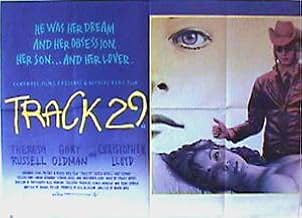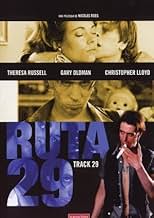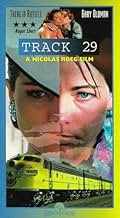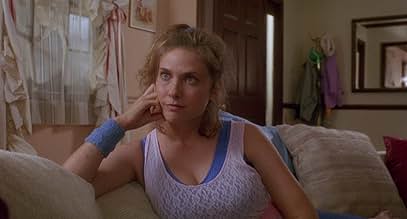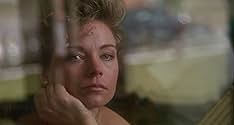AVALIAÇÃO DA IMDb
5,8/10
2,7 mil
SUA AVALIAÇÃO
Linda ainda é atormentada por ter dado um bebê para adoção aos 15 anos. Ela quer um bebê, mas seu marido já tem o suficiente: seus trens em miniatura, sua amante e o fato de ser médico.Linda ainda é atormentada por ter dado um bebê para adoção aos 15 anos. Ela quer um bebê, mas seu marido já tem o suficiente: seus trens em miniatura, sua amante e o fato de ser médico.Linda ainda é atormentada por ter dado um bebê para adoção aos 15 anos. Ela quer um bebê, mas seu marido já tem o suficiente: seus trens em miniatura, sua amante e o fato de ser médico.
- Prêmios
- 1 vitória e 2 indicações no total
Vance Colvig Jr.
- Mr. Ennis
- (as Vance Colvig)
Elijah Perry
- Redneck
- (as Jerry Rushing)
Toni De Rose
- Young Linda's friend
- (não creditado)
Avaliações em destaque
The bored, lonely wife of a retirement-home physician in North Carolina dreams up an adult embodiment of the baby boy taken away from her when she was an unmarried teenager who got knocked-up at the county fair. Her husband, a train enthusiast, has no patience with his wife's melancholia and cheats on her with his lascivious nurse, while the young man/substitute son comes to represent the wife's anger and isolation. Disconnected filmmaker Nicolas Roeg predictably provides no simple solutions for our heroine, and screenwriter Dennis Potter (who would seem to be the perfect movie-companion for Roeg) merrily keeps the inscrutable scenario on a schizophrenic track. This isn't the weirdest movie to come from either Roeg or Potter--the film, in fact, is one of Roeg's more accessible entries--but very few of the details or ideas come to fruition (such as the wife always being dressed in lavender, or her fetish for cartoons and dolls). Gary Oldman, just off "Sid and Nancy", seems stuck in a revolving door of violent angst and aggression (only in a later scene at the piano does he show some charm), while Christopher Lloyd (as Henry Henry--perhaps an ancestor of Humbert Humbert) relies far too much on his rubbery facial expressions. In the lead, Theresa Russell works hard at conveying her character's inner-demons; in the vivid flashback scenes to her youth, she makes a terrific impression just by using her faraway eyes and smile. However, Russell never gets her little-girl twang quite right--her voice sounds disembodied--and her temper tantrums aren't shaped and have no comic pay-off (which is the fault of the director, who turns a blind eye). After the perverse-glossiness of something like 1986's "Blue Velvet", the scrubby ordinariness of "Track 29" is disappointing and dispiriting (it was shot by Alex Thomson, who has worked with Roeg before). Roeg, a brilliant cinematographer in his youth, gets a kinetic vibe going in the flashbacks to the fairground; however, aside from those startling early shots and some stray funny moments, "Track 29" seems to lose its way awfully soon, and the apocalyptic final act is simply a mess. *1/2 from ****
Yet another indecipherable movie from director Roeg; it plays like a puzzle that is never solved. Definitely not uninteresting, because of the unique nature of the plot, but so muddled and inconsistent (for example, a seemingly imaginary character interacts with other people as if he really existed) that it's not likely to satisfy many viewers. One or two (intentionally) funny scenes help. Extremely offbeat performance by Gary Oldman. (**)
The plot is wacky enough to promise a great film: a repressed alcoholic middle-class housewife with incestuous tendencies, married to a doctor with infantilism tendencies, encounters a young English guy who turns out to be her lost son (fruit of a teenage rape, whom she had to give for adoption). But it's not clear what's real & what's not. Freud would be proud.
The bad thing is seeing how generic Hollywood-ian Nicolas Roeg's direction has become. There really is very little here that reminds of "Don't Look Now" or "Bad Timing". Not that it's not worth watching. The spanking sequence is hilariously disturbing, the film has the feel of a hysterically surreal 80's soap opera, and the interplay between past, present, reality & fantasy is sometimes inspired.
In fact David Lynch ended up copying lots of stuff from here, particularly on "Twin Peaks" and "Lost Highway". Notice for example the demonic rape scene, or the merging of the truck driver and lost son characters.
The bad thing is seeing how generic Hollywood-ian Nicolas Roeg's direction has become. There really is very little here that reminds of "Don't Look Now" or "Bad Timing". Not that it's not worth watching. The spanking sequence is hilariously disturbing, the film has the feel of a hysterically surreal 80's soap opera, and the interplay between past, present, reality & fantasy is sometimes inspired.
In fact David Lynch ended up copying lots of stuff from here, particularly on "Twin Peaks" and "Lost Highway". Notice for example the demonic rape scene, or the merging of the truck driver and lost son characters.
A doctor's wife (Theresa Russell) tires of his obsession with model trains, and spends her days wondering about the son she gave up for adoption at birth...
How can you not love a film with Christopher Lloyd as a masochist doctor who drops his pants? And Gary Oldman as a weird, British man-child? And directed by the wonderfully under-appreciated Nicholas Roeg ("Don't Look Now")? Well, with this film, it is possible.
Janet Maslin has more than a few problems with it, as she says "the direction is so laden with contempt for the characters... Roeg's films can often be perverse... (but) they are rarely this silly." The film is "too mindless to have any impact" and she believes the actors' skills are "regrettably wasted". I will agree with that last point -- for as much as I love Oldman and Lloyd, I felt they were too confined by this film to really show off.
Roger Ebert gave the film three stars, despite saying he did not like it. He posits the idea that the film is "perhaps deliberately" unlikeable. Yet, the film is still a good one and "more interesting" because of it. Roeg's work is "strange" and "convoluted", as well as "bad-tempered, kinky and misogynistic."
While I am unsure of all that, I do agree with the overall point Ebert makes. I, like him, did not enjoy the movie. Yet, I see the psychological message it was trying to send, the odd symbolism and the cacophony of images. The direction is, in fact, top-notch. Oldman is frustratingly annoying, but that is who his character is. I think the goal was met, despite being a goal I had rather they were not striving for.
How can you not love a film with Christopher Lloyd as a masochist doctor who drops his pants? And Gary Oldman as a weird, British man-child? And directed by the wonderfully under-appreciated Nicholas Roeg ("Don't Look Now")? Well, with this film, it is possible.
Janet Maslin has more than a few problems with it, as she says "the direction is so laden with contempt for the characters... Roeg's films can often be perverse... (but) they are rarely this silly." The film is "too mindless to have any impact" and she believes the actors' skills are "regrettably wasted". I will agree with that last point -- for as much as I love Oldman and Lloyd, I felt they were too confined by this film to really show off.
Roger Ebert gave the film three stars, despite saying he did not like it. He posits the idea that the film is "perhaps deliberately" unlikeable. Yet, the film is still a good one and "more interesting" because of it. Roeg's work is "strange" and "convoluted", as well as "bad-tempered, kinky and misogynistic."
While I am unsure of all that, I do agree with the overall point Ebert makes. I, like him, did not enjoy the movie. Yet, I see the psychological message it was trying to send, the odd symbolism and the cacophony of images. The direction is, in fact, top-notch. Oldman is frustratingly annoying, but that is who his character is. I think the goal was met, despite being a goal I had rather they were not striving for.
Nicholas Roeg's "Track 29", while confusing and frustrating, appears to accomplish what the director and writer set out to do. The film introduces and examines many aspects of Linda's life that are never very clearly answered. If Martin is a figment of her imagination, what is truly imagined? He does appear at the hamburger stand, so is he real after all? Early in the film, a television program is overheard discussing the idea that "two things may ocupy the same time and space". If this is indeed true, than maybe one thing can ocupy more than one time and space. It appears that Linda and Martin may in fact be "exploring" alternate dimensions. The film seems to explore the occurrence and outcome of many different events, and ends with the viewer unclear about what truly happened and what did not. After undergoing real or imaginary emotional torture, Linda calmly collects herself and leaves the house a new woman. To further confuse the lines between imaginary/real, her husband is heard calling to her, even though a pool of blood is forming over her head. (presumably from the stabbing death of the same husband) It is through these very strange events and ideas that the director and writer force the viewer to attempt to decide what is real and what is imagined. The most frustrating thing of all is that there is no real answer to this question.
Você sabia?
- CuriosidadesThe young Linda is seen with posters of George Harrison (executive producer of this movie) and David Bowie (star of director Nicolas Roeg's hit O Homem Que Caiu na Terra (1976)) on her bedroom wall.
- Erros de gravaçãoAfter being confronted by Martin (Gary Oldman) during her attempted (pseudo)-suicide by drowning herself in the pool, Linda Henry (Theresa Russell) exits the pool for the very first and only-ever time and there is plainly seen a trail of dripping water leading from where she is exiting the pool over to where she is retrieving her towel, clearly left over from a previous take of the same sequence just moments before.
- Citações
Henry Henry: If there's one thing I've learned in this world, it's that women and trains don't mix!
- Trilhas sonorasM.O.T.H.E.R.
By Theodore Morse and Fiske O'Hara
© 1915 Leo Feist Inc.
Used by Permission of Ascherberg, Hopwood & Crew Ltd.
Lyrics by Howard Johnson (uncredited)
Performed by Gary Oldman (uncredited)
Principais escolhas
Faça login para avaliar e ver a lista de recomendações personalizadas
- How long is Track 29?Fornecido pela Alexa
Detalhes
- Data de lançamento
- Países de origem
- Central de atendimento oficial
- Idioma
- Também conhecido como
- Track 29
- Locações de filme
- Empresa de produção
- Consulte mais créditos da empresa na IMDbPro
Bilheteria
- Orçamento
- US$ 5.000.000 (estimativa)
- Faturamento bruto nos EUA e Canadá
- US$ 429.028
- Fim de semana de estreia nos EUA e Canadá
- US$ 19.304
- 11 de set. de 1988
- Faturamento bruto mundial
- US$ 429.028
- Tempo de duração
- 1 h 31 min(91 min)
- Cor
- Mixagem de som
- Proporção
- 1.85 : 1
Contribua para esta página
Sugerir uma alteração ou adicionar conteúdo ausente



